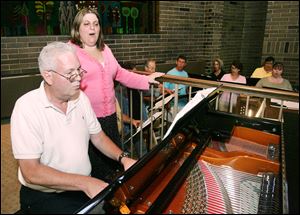
New cantor is ready for Rosh Hashanah
9/4/2010
Bob Rae accompanies cantor Raina Siroty during a recent rehearsal at Temple-Shomer Emunium.
Cantor Raina Siroty of the Temple-Congregation Shomer Emunim has had just enough time to get settled into her new job and community before the High Holy Days begin Wednesday with Rosh Hashanah.
“I've been busy!” Ms. Siroty said with a laugh. “It's been jam-packed — bar Mitvah tutoring, working with the High Holiday choir, getting to know the people of Toledo and my congregation, and just getting ready for the High Holidays, which is wonderful. I'm excited about that!”
Excitement and enthusiasm are evident when Ms. Siroty talks about a career that allows her to combine a love of music and her faith.
She decided on the cantorate during her college years, after drifting away from Judaism in childhood.
The 32-year-old cantor, who grew up in Beverly Hills, Calif., said in an interview at her temple office that her parents divorced while she was in grade school and her mother could not afford to pay the membership dues for the temple.
Her return to Judaism began when she was a music student at Indiana University and became involved in Hillel, the Jewish student organization (she later transferred to University of California-Santa Barbara, from which she graduated with high honors).
“At IU, I was one out of 35,000 students,” she said, “and Hillel was a place where I felt welcomed and at home. And it was always somewhere I knew I could go every Friday night for services and always see the same core group of people … and have a wonderful time celebrating the Sabbath.”
Attending Hillel events, she realized that her gift of singing could be combined with Judaism in a career as a cantor.
“I was studying opera and musical theater and I decided that I wanted to have a stable life and be able to bring music to people all the time, and not just on the stage, and to be able to have a one-on-one relationship with people and be able to share my music with them in that regard,” Ms. Siroty said.
She had some catching up to do, however.
For one thing, she did not know Hebrew, which is a prerequisite for cantorial school. So she enrolled in an intensive two-year program in which she studied Hebrew for 25 hours a week.
Ms. Siroty enrolled in a precantorial program at Hebrew Union College in Los Angeles in 2002 and spent her first year of cantorial school, 2005, in Jerusalem.
She wrote a dissertation on her great-uncle, Hazzan Gershon Sirota, a world-famous tenor from Warsaw who sang at Carnegie Hall and other renowned venues from Buenos Aires to London during the early to mid 20th century.
Ms. Siroty said she enjoys the pastoral roles of a cantor, and when it comes to music, her goal is to find the right balance between “listening moments and congregational singing moments in a service.”
“It's important for us to share the music of past generations with our synagogues, to make sure that is not lost, as well as being able to involve the congregation in singing and being able to bring their own voice in prayer,” she said.